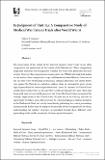In judgment of Unit 731 : a comparative study of medical war crimes trials after World War II
Abstract
The prosecution of the crimes of the Imperial Japanese Army’s Unit 731 are often compared to the prosecution of the crimes of the Nazi doctors. These comparisons emphasize immunity for the Japanese, whereas the Nazis were prosecuted for their actions. However, this comparison is an inaccurate one. While both trials look similar on the surface, their composition, scope, and framework were different. Conscious of the fact they were establishing international criminal precedent, the United States’ case against the Nazi doctors relied on military chain of command to prove strong legal responsibility for human experimentation crimes. In contrast, the United States avoided prosecuting Unit 731 because they could not replicate the same clear legal framework used to successfully prosecute the Nazis. The Soviet Union recognized the strategic implications of the United States’ decision not to try Unit 731 and saw an opportunity to strike a moral blow, not only by convicting Japanese military members at the Khabarovsk Trial, but also by immediately publishing the court’s proceedings internationally. Rather than focusing on the morality of who was punished by whom, understanding the military structures as identified through these different court proceedings could enable prevention of crimes against humanity.
Citation
Cranmer , V J 2023 , ' In judgment of Unit 731 : a comparative study of medical war crimes trials after World War II ' , Journal of American-East Asian Relations , vol. 30 , no. 1 , pp. 32-60 . https://doi.org/10.1163/18765610-30010002
Publication
Journal of American-East Asian Relations
Status
Peer reviewed
ISSN
1058-3947Type
Journal article
Collections
Items in the St Andrews Research Repository are protected by copyright, with all rights reserved, unless otherwise indicated.

